As it happened: Sh37.2 trillion budget unveiled
Relive how the multi-trillion shilling national budget was unveiled on Thursday in Kampala.
2018/19 NATIONAL BUDGET
Live reporting by Joseph Kizza
____________________________________________
6:00pm Good evening
That's all for today here.
Stick to this website for related stories.
Cheers!
5:50pm 'Human beings can play a role'
After the end of the session, Museveni gets back briefly on the microphone to talk more about crime.
In reference to MP Ibrahim Abiriga's murder last week, Museveni says lay human beings can play a role in crime prevention.
In all these cases, there are signs. There are clues. If there was vigilance by the whole community, they would have mobilised and perhaps have frustrated the legislator's killers.
5:33pm ON CRIME: No more police bond
In an emphatic tone, President Museveni says there one thing he will not accept anymore: Police bond.
"Someone who is suspected of killing our people and you give him or her police bond? No way!
And to the judiciary . . .
"Bail for killers is not acceptable. I don't want conflict between institutions, but I am here in two capacities - as President and as leader of revolutionaries."
5:29pm ON CRIME: The 'pigs shall be crashed'
Onthe issue of security in the country, Museveni asks Parliament that he appears there this coming week to address the nation on the matter.
"We are going to defeat these pigs - and this is a biblical statement," he says, making reference to the Bible.
"All those involved shall be crashed!"
5:21pm 'Factories are going to flock here'
President Yoweri Museveni said attracting Foreign Direct Investments (FDIs) is very important.
"I can guarantee you, that with low cost of electricity, low cost of labour and low cost of transport, factories are going to flock here."
5:15pm Youths are very important
Like he mentioned in the state of the nation address last week, President Yoweri Museveni says involving youth in the economy is very important for growth.
"Come as a group and we give you support so that you run a maize mill," he urges young people.
Museveni says the approach should be systematic - from maize, you move on to leather, etc.
5:09pm 'We are wasting a lot of money'
While talking about the need for commercialisation of agriculture, the president says that Uganda has a lot of money and therefore money is not the problem - instead, it is the mindset of the people still enagaged in subsistence agriculture.
"We have a lot of money. Money is not our problem. The problem is the mindset. In fact, we are wasting a lot of money. For example, we put off sh450b for NAADS. But the problem is that the seedlings you buy are like grants to the receiver. Imagine if it was a revolving fund."
He says Uganda needs to commercialise the entire agricultural sector.
5:04pm 'Four lows'
President Museveni says that part of the economic strategy is to engage what he calls "four lows':
- Low cost of electricity
- Low cost of transport
- Low cost of money
- Low cost of labour
"That's how we are going to be more competitive and attract investors," the President says.
4:57pm MUSEVENI DELIVERS ADDRESS
After Speaker Rebecca Kadaga makes her remarks, before inviting President Yoweri Museveni to the fore to deliver his remarks.
4:55pm Resource envelope
The minister says the resource envelope for the financial year
2018/19 is as thus:
- Domestic Revenue amounting to sh16,358.8b, of which sh15,938.8b will be collected by URA as tax revenue and sh420b as non-tax revenue
- Domestic borrowing amount to sh1,783.4b
- Budget Support amounting to sh289b
- External financing for projects amounting to sh7,734.5b of which sh6,148.9b is in loans, and sh1,585.6b is grants
- Appropriation in aid, collected by Government departments amounting to sh1,063.5b
- Domestic debt re-financing will amount to sh5,271.5b.
The finance minister says the total resource envelope has been allocated to budget expenditure and amounts to sh32,702.8b (sh32.7 trillion).
After this, he makes his conclusion and submits, leaving the podium to a huge warm applause. He looks weary, but contended with the task he has just completed.
4:55pm Tax evasion hurting efforts
The minister says one of the major challenges undermining Uganda's tax effort is tax evasion. For example, about 30% of eligible Value Added Tax (VAT) is not collected, translating into a loss of about 4% of tax to GDP.
So what will be done to strengthen tax administration?
The Uganda Revenue Authority will continue to implement the following measures:
- Strengthen business intelligence and risk management functions to detect non-compliance
- Expand the revenue management system to other revenue
geographical areas beyond Kampala
- Enhance tax arrears management
- Increase tax intelligence operations to curb smuggling
- Deployment of container scanners at the major entry stations
to facilitate faster clearance of goods;
4:53pm Medium Term Revenue and Expenditure Framework
On domestic revenue mobilization
Uganda’s tax revenue effort at 14% of GDP remains low and inadequate to finance our development needs. Accordingly, the Domestic Revenue Mobilization strategy
will address policy, technical and administrative issues in enhancing tax and non-tax revenue collection.
The strategy will be completed in September 2018 to guide implementation in Financial year 2019/20.
On revenue performance
Total tax and non-tax revenue is estimated to amount to sh14.4 Trillion this financial year.
Non-tax revenue collections for this year is estimated at sh430.4b against the target of sh380 billion.
Revenue outlook
Total domestic revenue is projected to be 16.4 trillion in financial year 2018/19, an increase of sh1.9 trillion over this financial year.
4:51pm On governance and service delivery
In 2018/19, the finance minister says construction of Parliament will continue and civil works for the Inspectorate of Government, the Public Procurement and Disposal of Assets Authority, Uganda Road Fund headquarters and the Government Office Campus at Bwebajja, will kick off.
Kasaija adds that salary and pension reforms that have been implemented over the last three years have yielded "tremendous results".
The monthly payment of salaries and pensions has been streamlined. Almost all pension and gratuity arrears have been cleared apart for those of the military and ex-servicemen.
The minister delivers that implementation of Government projects is undermined by lack of readiness by ministries, agencies and local governments. Delays in procurements, late acquisition of right of way and poor contract management are
major causes of low absorption of funds.
4:49pm On governance and service delivery
In the financial year 2018/19, priorities to increase access to justice include the automation of Court Administration System, construction of 4 new justice centers in Amudat, Kyegegwa, Butambala, Namaiyingo Districts and the regional Justice
Law and Order Sector House in Fort Portal. Construction of the Justice Law and Order House at Naguru will also be fasttracked.
4:44pm Social empowerment
The finance ministry has provided sh66 billion next Financial Year for the Youth Livelihood Programme to fund over 5,000 youth enterprises and benefitting 61,000 youth.
"I have also provided Shs. 39 billion to support about 2,700 women enterprises targeting 35,000 women," says minister Kasaija.
4:38pm Water and sanitation
"Government’s objective for the FY 2018/19 is to increase access to safe water in rural areas from 71% today to 79%. Urban water access is targeted to increase to 100%. The target for sanitation is to reach 86% next year," says Kasaija.
"Madam Speaker, I have allocated sh1.3 trillion to the Water and Sanitation sector next financial year," he adds.
4:33pm Top health interventions
The minister says that health interventions will be placed on improving maternal and new born child health and equipping the health facilities to diagnose and treat diseases.
Human resource in healthcare provision will also be strengthened.
The minister has allocated sh2.3 trillion to the health sector next financial year
4:24pm On education
What the government plans to do this financial year:
- Commence, with support of the World Bank, civil works in selected primary schools and provide instructional materials
- Procure instructional materials including bilingual dictionaries, for use in teaching in local languages in Primary schools
Operationalize through teacher provision, 100 secondary schools in 92 Local Governments in pursuit of establishing a Government Secondary School in sub counties without any.
As much as sh2.8 trillion has been allocated to Education sector next financial year
4:24pm ICT progress
Kasaija says the information and communication technology subsector registered "significant progress" in the financial year ending, the
For instance, the cost of internet bandwidth for Government has reduced from $300 per Mbps per month in 2016 to $70 in 2017.
The cost of internet bandwidth for private sector and citizens has also reduced from an average of $375 to $237 between 2016 and 2017.
Among government's plan in the coming fiscal year include:
- reserving a percentage of procurement of ICT Services for competent local innovators
- enforcing the use of common ICT Services, including data sharing, e-Payments, Unified messaging, the Programme Based Budgeting System across the whole of Government in order to eradicate duplication of ICT Systems
and . . .
- developing regional ICT innovation hubs to stimulate incubation of ICT innovations and transform them into usable products
"Madam Speaker, I have allocated sh149 billion for the ICT sector next financial year," the minister says.
4:24pm NATIONAL AIRLINE TO BE REVIVED
According to Kasaija, during the next financial year, the national airline will be revived.
That point receives a huge applause. Deservedly so.
He adds that the redevelopment of Entebbe International Airport has "progressed well". The new cargo center is 30% complete and 20% works for the modification of the passenger terminal building is done.
As much as sh4.8 trillion has been allocated to the works and transport sector in the financial year 2018/19.
4:17pm Electricity, roads
On electricity, the minister says the current power generation is estimated at 930 MW. An additional 783MW will be added to the national grid in the next two years
on completion of the 600MW Karuma and 183 MW Isimba power projects.
In the financial year 2018/19, priority will be given to expansion of the transmission and distribution networks to industrial zones and rural growth centers
On roads . . .
Kasaija says "increasing the stock of road infrastructure
remains a key priority and significant progress has been made
this year" for example the Fort Portal-Kamwenge and the Mbarara Bypass
roads were completed.
Partial works were completed, totaling 806 kilometers of roads that are being upgraded to tarmac.
We learn that today, the total length of paved roads in Uganda now stands at 5,350 kilometers, compared to 987 kilometers in 1986.
The minister says they have allocated sh607 billion to cater for maintenance for national, district, urban and community roads.
4:10pm Minerals, oil and gas
In 2017/18, the mineral sub-sector attracted $1.63 billion in capital investment by the private sector.
To in order to consolidate the performance of this subsector, government will do a number of things. One of them is to enact a new legal, fiscal and regulatory framework to govern the mining industry.
In the oil and gas subsector, some of the key steps taken towards facilitating oil production is government's completing of acquisition of the Refinery Project Land.
On top of that oil companies that were granted licenses to start production have completed Field Development Plans.
4:07pm Tourism
Kasaija says that by 2020, tourism is targeted to earn $2.7 billion annually and tourist visitors are expected to reach 4 million annually, compared to 1.3 million today.
To ensure viability of the sector, among the things government has done is to intensify land patrols in the national game parks in order protect tourism resources.
Promoting domestic tourism is also Government’s priority.
"Madam Speaker, I have allocated the Tourism Sector sh32 billion next financial year."
3:57pm Commercialising agriculture
The minister now focuses on performance and respective priority interventions that have been approved in the 2018/19 budget.
He, for example, says coffee exports have increased from 3.6 million 60kg bags
recorded in financial year 2015/16 to 4.14 million bags recorded between July 2017 and May 2018.
To enhance water for production, five newly constructed irrigation schemes were commissioned, 50 smallscale irrigation demonstrations and water harvesting sites were completed, 155 valley tanks were constucted, construction of seven small scale solar-powered irrigation schemes was completed and contracts for design of five multi-purpose storage dams were finalised.
Kasaija says his ministry has allocated sh893 billion to the agriculture sector.
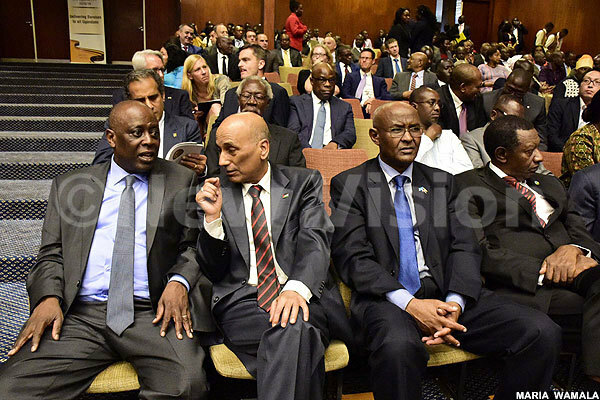
3:55pm Commercialising agriculture
So how will government achieve, for example, commercialisation of agriculture plan?
It will do so by:
- organizing farmers into producer cooperatives or groups linked to nucleus commercial farmers
- providing agricultural extension services to improve farming practices
- reducing reliance on rain-fed agriculture and mitigating impact of climate change through irrigation
- completing the rural electrification programme to rural growth centers
- strengthening enforcement of regulations for standards and quality assurance
- facilitating market access for agricultural products through export development
Among several other ways that the minister outlines.
3:50pm Time to deliver
Kasaija says that this time round, the budget, strategy seeks to address development challenges and fulfil on the commercialisation of agriculture, industrialisation and productivity enhancement as well as financing private sector investment.
3:47pm Fiscal policies
Government plans to pursue fiscal and monetary policies that "maintain macroeconomic stability and support inclusive growth, while safeguarding debt sustainability".
In the coming financial year, the fiscal policy will continue to support ongoing infrastructure investment and social service delivery.
Structural reforms will focus on enhancing the budget process, public investment management, preparing for oil production and strengthening the financial sector.
3:44pm 'Very positive' economic outlook
According to finance minster Matia Kasaija, the outlook for Uganda's economy is "very positive".
The economic activity is projected to expand by at least 6% in 2018/19 to 7% per annum in the medium term.
3:42pm Budget deficit, public debt
We learn that the fiscal deficit this year is estimated at 4.8% of GDP, a 0.9% point increase over last year’s level.
Minister Kasaija says the deficit "was financed largely by both concessional and non-concessional loans, and to a lesser extent through domestic borrowing", which increased from sh612b last year to sh1,690b this year.
As at March 2018, public debt stood at $10.53 billion, of which $7.18 billion is external and $3.35 billion is domestic.
Kasaija says that in line with the Medium Term Debt Strategy, "our borrowing strategy is to contract concessional loans while restricting commercial loans to the financing of infrastructure and self-financing projects - to ensure long-term
debt sustainability."
3:38pm On Gov't expenditure
The minister says the total government expenditure during this financial year is estimated to amount to sh27 trillion.
That is equivalent to 26.5% of the GDP.
"Excluding domestic refinancing, development expenditure this year amounted to 44% of the budget," Kasaija adds.
3:33pm Domestic revenues
During the 2017/18 financial year tax and non-tax revenue is estimated at sh14.5 trillion, which is equivalent to 14.2% of GDP.
Kasaija says transferring the administration of non-tax revenue to Uganda Revenue Authority has significantly improved revenue collection from this source.
3:30pm Shilling 'relatively stable'
The Ugandan shilling was "relatively stable against the US
dollar" during the first half of the financial year ending, the minister reveals, adding that the shilling marginally weakened against the US dollar by only 0.6%.
3:28pm Export earnings rose
On international trade, the minister says that export earnings rose by 9.6% to $3.93 billion in the period July 2017 to March 2018 from $3.59 billion a year earlier.
Imports increased by 16.4% valued at $ 5.7 billion in the same period from $ 4.9 billion over the same period the previous year.
3:23pm Inflation stable
"Despite the increase in the global price of oil this year, inflation has remained stable and in single digit. Annual headline inflation is projected to average 3.6%. This is mainly due to the increased supply of agricultural output, coupled with sound economic policy management," Kasaija delivers.
Meanwhile, on private sector credit and interest rates, Kasaija tells Parliament that the stock of outstanding Private Sector Credit increased from sh11.9 trillion in March last year to sh12.8 trillion in March 2018.
This is reflection of an annual growth of 7.8%, higher than 6.1% a year earlier.
3:20pm Economic growth
According to the finance minister, economic output is estimated to grow by 5.8% during this financial year, higher than the performance of 3.9% last year.
"The size of the economy is now sh101.8 trillion," he says.
This growth is as a result of growth in services, industrial and agriculture sectors.
3:17pm Theme: 'We consulted with EAC partners'
This budget is under the theme 'Industrialization for Job Creation and Shared Prosperity'.
So how did they narrow on this choice?
"We ad opted this theme this financial year in consultation with the East African Community partners. It will guide the budget in both preparation and execution for the next three financialyears," Kasaija says.
3:15pm 'Challenges exist'
Despite the gains over the years, the minister says challenges do exist. For example, 68.9% of Ugandan households remain engaged in the subsistence economy.
Also, inequality between rural and urban areas has risen.
Another lowlight is the agricultural sector, whose growth has been low (annual growth rate of less than 2% over the last two decades).
These are some of the many other challenges that the minister underlines.
3:11pm Better access to electricity, source of drinking water
Kasaija says that about 86% of the population are within a 5km access to health facilities, more families are living in houses built with permanent, access to the national electricity grid has increased as has access to improved sources of drinking water.
On education, the minister says as many as 10.2 million pupils enrolled in primary schools in 2017 compared to 8.7 million in 2013.
3:08pm Improved quality of life
Inhis introductory comments, Kasaija says Uganda is "now at peace peace and without any civil conflict", which he says provides an ideal environment for investment.
"Security of persons and property reigns, although some criminal minded individuals want to disrupt this peace," he adds.
The minister says that incomes have increased. Average per capita incomes have almost doubled in the past eight years.
The number of Ugandan employees in the formal sector grew
at an average annual growth rate of 6% between 2010
and 2013 and the national unemployment rate declined.
3:06pm FINANCE MINISTER KASAIJA DELIVERS NATIONAL BUDGET
Now, minister Kasaija takes his position at the podium to deliver the national budget highlights.
The budget, delievered at the meeting of the 3rd Session of the 10th Parliament of Uganda, was "duly approved by Parliament on June 1" after minister Kasaija presented it to the House on March 25.
The budget is very detailed, for that reason, the minister says he is presenting only the highlights of the approved budget.
2:59pm Proclamation and introduction by chairperson
The session gets underway after the President is led into Victoria Hall and the national anthems are sung.
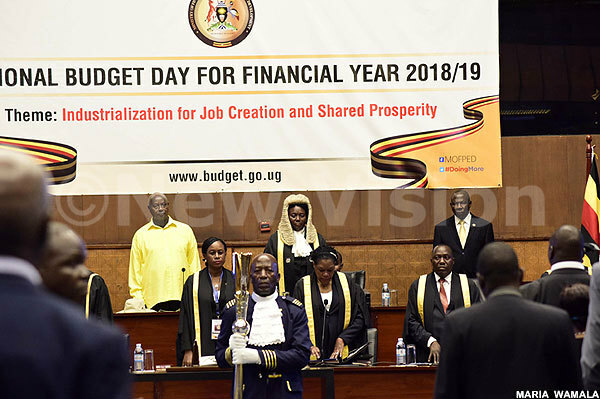
Item 3 of the Order Paper is the proclamation by the Speaker of Parliament - Rebecca Kadaga.
The Speaker, therefore, declares Serena Conference Centre as the Parliament for this special stitting.
Then, as chairperson of the session, Kadaga makes her opening remarks, during which she calls for a moment of silence to remember the recently departed legislators, including Arua Municipality MP Ibrahim Abiriga.
2:45pm Catch everything live on Bukedde TV
#UGBudget18 Embalirira ya buse(Trillion) 32 n'obuwumbi 7 pic.twitter.com/BfcFSElFEi
— Bukedde TV (@bukeddetv) June 14, 2018
|
2:25pm PRESIDENT MUSEVENI ARRIVES 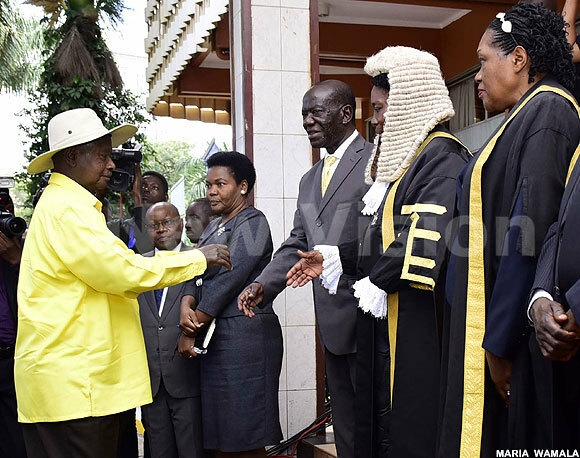
|
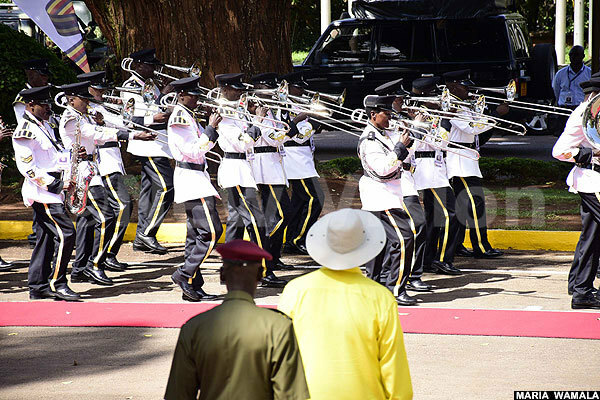
2:19pm Budget discussion at Vision Group
. @VisionGrp Budget Discussion Panel set to analyse the #UGBudget18 .The panel consists of experts from various sectors affected by the Budget. #VisionUpdates pic.twitter.com/25I7lgLWa4
— New Vision UGANDA (@newvisionwire) June 14, 2018
2:12pm Benefitting from tourism
From the budget session at Vision Group head office in Kampala . . .
#UGBudget18 | TOURISM
— New Vision UGANDA (@newvisionwire) June 14, 2018
Qn from @VisionGrp CEO @rkabushenga What should Uganda do to benefit from Tourism?
Answer: Amos Wekasa CEO Great Lakes Safari
1. Good branding
2.Train Ugandans in hospitality
3.Rearrangement of the Tourism Industry #VisionUpdates pic.twitter.com/M0O6g5eNrW
2:07pm All set and good
There are two giant screens at the front of the Victoria Hall interior -- on the left and right sides.
The minister of foreign affairs, Sam Kutesa, has just walked in as have several other people.
1:48pm Matia Kasaija - finance minister from 2015 to-date
Thiis will be the third time that Matia Kasaija is presenting the national budget as minister of finance.
He was appointed to take charge of the ministry in 2015, from Maria Kiwanuka (2011 - 2015).
Previous finance ministers include Syda Bbumba, Ezra Suruma, Gerald Ssendaula, Mayanja Nkangi (RIP) and Crispus Kiyonga.
Meanwhile, the band is playing inside the Victoria Hall as the large room fills minute by minute.
|
1:37pm MINISTER MATIA KASAIJA ARRIVES
|
1:22pm Settled in already
President Yoweri Museveni is expected at Serena Conference Centre - the venue for this special sitting of Parliament today.
For now, the Victoria Hall, where the session is to take place, is getting filled.
Politicians and other dignitaries are taking their seats - as they exchange greetings, handshakes and high fives.
The mood is warm.
1:00pm Live on Urban TV
The national budget reading session will be live on Vision Group's Urban TV.
Don't forget to tune in.
Follow the #UGBudget18 reading session & our studio commentary all coming to you live on @UrbanTVUganda
— Urban Television (@UrbanTVUganda) June 14, 2018
TUNE IN pic.twitter.com/qykLBSSwi5
11:56am Budget: People living with albinism happy
People living with albinism in Busoga sub-region have commended Parliament for waiving taxes on sunscreen lotions, which are essential in protection against skin cancer.
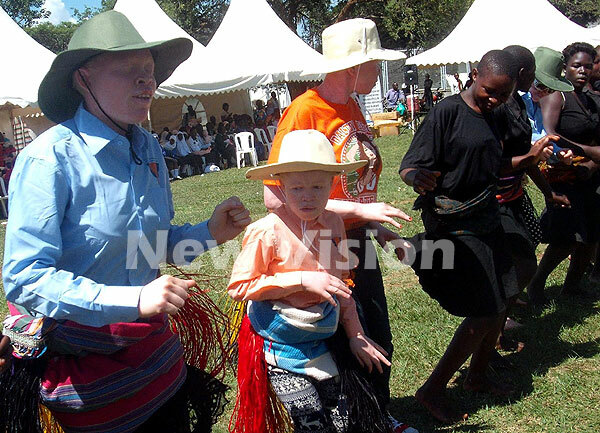
Wednesday saw celebrations marking the 4th International Albinism Awareness Day held at Busoga Square in Jinja town.
During the event, Peter Ogik, the chairman of Source of the Nile Persons with Albinism (SNUPA), noted that the recent pronouncement by Parliament had started bearing fruit.
“As a result, last week we received a consignment of sunscreen lotions and we are hopeful this will go a long way in improving the quality of life of people with albinism,” he said.
According to Ogik, the donation worth over sh500m was made by Advantage Africa, an organisation that promotes rights of people living with albinism. It included 4,916 lotions to be distributed to over 700 people.
11:47am Sector priorities
Sector Priorities for FY 2018/19 #UGBudget18 #Economy https://t.co/mzzKU0upik #Uganda #budget #Tourism #Agriculture #BackgroundToTheBudget pic.twitter.com/xfoh1hDq5u
— Louis Jadwong (@Jadwong) June 14, 2018
11:25am Budget estimates
These are the financial budget estimates for financial year 2018/19 #UGBudget18 pic.twitter.com/CpaHidH5ea
— Parliament Watch (@pwatchug) June 14, 2018
11:10am IMF upholds Uganda’s growth outlook
|
Ali Twaha, New Vision business reporter: 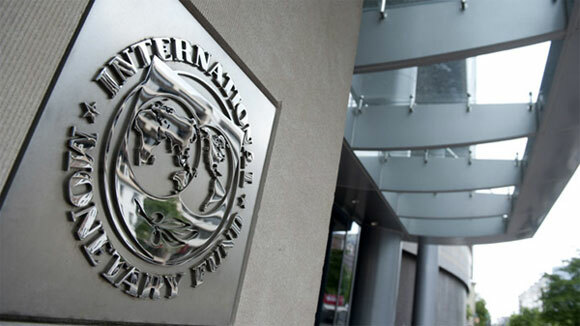
“Compared to the 2016/17 financial year where growth was below 4%, we estimate that growth will reach 5.8% in 2018, and we see the growth continue for the next year as well,” Mira said.
|
10:52am 'Nothing new'
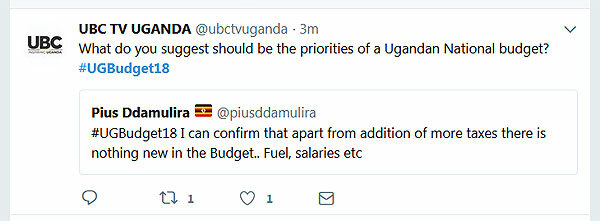
10:25am Global stage
The 2018 World Cup is kicking off this evening in Russia.

So, if you have a soft spot for soccer and are looking forward to moves like the one pictured above, budget your evening time accordingly.
10:23am Meanwhile . . .
By the way, as you budget for your time today, remember there is an important kickoff due later today.

10:17am The budget down the history lane
Besides President Yoweri Museveni, the only other chief executive to rule Uganda for over a decade was Milton Obote, who in his second regime used to present his budget himself. Since 1986, President Museveni has had eight ministers of Finance who present his budget.
If you are interested in going back down the lane in the context of the budget in Museveni's regime, this read will do you good.
10:10am 200b for fish farming
|
The Government, through the Ministry of Agriculture, Animal Industry and Fisheries, has embarked on promoting fish farming in order to diversify Uganda’s economy in regard to agriculture. The ministry has set aside sh200b out of a sh860b budget for fish farmers, in the next financial year. Farmers will first be sensitised about fish farming. 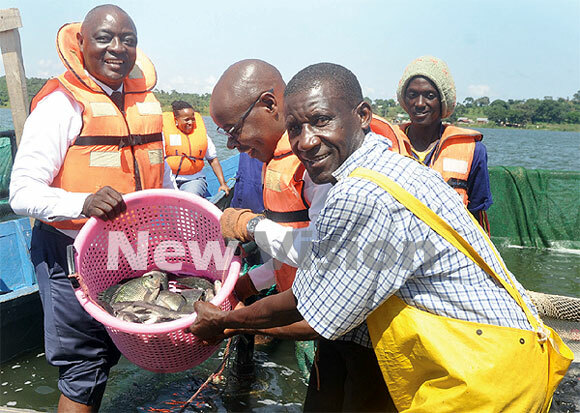
Agriculture minister Vincent Ssempijja (pictured left) says fish farming will be budgeted for in every financial year to promote Uganda’s exports. |
9:57am Dilemma
It's a common and a bit perplexing question: Why too much jam when it rains, especially in the city?
Joel has taken to Twitter to ask the authorities . . .
I have really failed to understand. Why is there a lot of #TrafficJamInKampala whenever it rains? Hey folks at @UNRA_UG, @KCCAUG, @MoWT_Uganda, @SGR_Uganda and @PoliceUg please tell me something good to feed on #Budget2018 pic.twitter.com/Wpz3xWFu9Q
— Wako Joel 🇺🇬 (@wakojoel) June 14, 2018
9:45am A glance from across the border
Here is what some of the dailies in neighbouring Kenya are headlining . . .
The Standard Newspaper Front page on Thursday, 14th June #thestandard @StandardKenya @KTNNews #rotich #BudgetKE2018 #Budget2018 pic.twitter.com/J2lVNfnr3v
— Front Pages (@FrontPagesKe) June 14, 2018
9:39am In focus
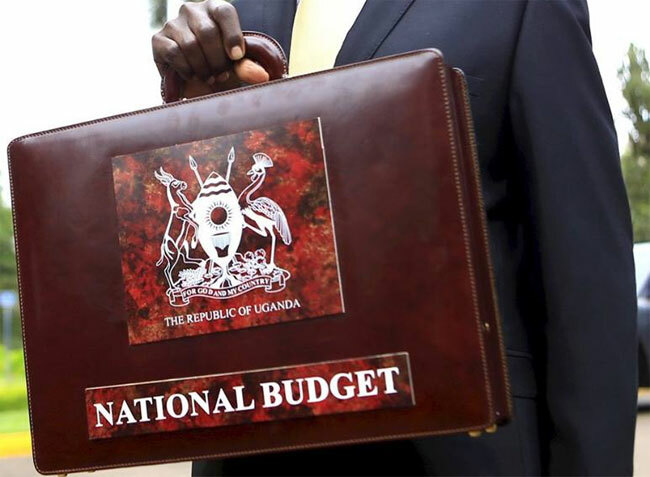
According to the director of budget at the finance ministry, Kenneth Mugambe, the 2018/19 budget will mainly focus on the commercialisation of agriculture and agro-processing, infrastructure development and private sector growth, improving
service delivery, especially in the health sector and salary enhancement for selected categories of public servants.
9:27am Budget Day for East Africa
In reference to what Allan was saying in his tweet (see 9:16am), you may want to know the unveiling of the national budget is not happening in Uganda only.
As in previous years, the other East African nations will also see their finance ministers present their respective national budgets.
For example, Kenya's finance minister Henry Rotich will be doing so . . .
Ririkana umuthi niguo Budget igukorwo igithomwo. Ikara ritho amu nitugukorwo tugikumenyithia uria maundu meguikara. #Kamemefm #Budget2018 pic.twitter.com/wU1nadFGsy
— Kameme Tv (@KamemeTvKenya) June 14, 2018
9:16am What you are saying
There is an air of expectation . . .
Happy #Budget2018 day East Africa. Today EAC ministers of finance expected to read out their respective national budgets.
— Atulinda Allan🇺🇬 (@Atulinda_Allan) June 14, 2018
9:02am Security sector gets more
Security undoubtedly remains a critical area in the current affairs of the nation. The coming national budget is reflecting just how it is one of the priority areas.
|
From today's New Vision newspaper: 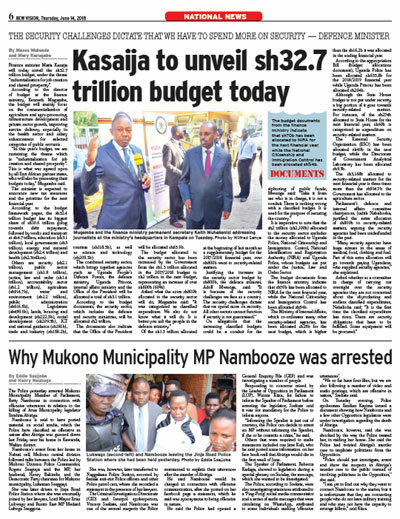
|
8:43am Where the rest of the money is going
The rest of the slices are going thus:
- Legislature (sh459.6b)
- Lands, housing and development (sh222.3b)
- Social development (sh209.3b)
- ICT and national guidance (sh181b)
- Trade and industry (sh158.2b)
- Tourism (sh118.3b)
- Science and technology (sh209.3b)
8:37am Where the rest of the money is going
Security, a critical sector in the country, has been allocated sh2.1
trillion, public sector management sh1.8 trillion, justice, law and order sh1.4
trillion, accountability sector sh1.2 trillion, agriculture sh914.7b, water and
environment sh1.2 trillion and public administration sh616.5b.
8:32am Where the rest of the money is going
Now that we know where the biggest part of the national cake is heading to, let's see where the rest is going.
After debt servicing, the works and transport sector will get sh4.7 trillion, education sh3.1 trillion, local governments sh3 trillion, energy and mineral development sh2.4 trillion and health sh2.3trillion.
8:25am Let's pay back what we owe - the largest portion
So who is taking the lion's share of the coming financial year's budget?
Debt repayment.
Yes. You heard that right.
The largest portion of the 2018/19 national budget will be used to service our debts.

According to the budget framework paper, the lion's share - sh10.6trillion - is going towards debt repayment.
8:13am What you are saying
A conversation on the budget has started on social media platforms. If you want to join the interaction, use the hashtag #UGBudget2018.
Here is what Daniel is saying . . .
Apart from agriculture, healthcare ...and industrialisation
— Olukadaniel🇺🇬🎧🤙🖐 (@OlukaDaniel5) June 13, 2018
More of Uganda's revenue has been wasted on roads that never brought valve to the country.. Hence limited the tourism industry and we say it's to change by 5% yet our economy can't grow beyon 23% a year 😨#Budget2018 pic.twitter.com/rFFtwmBBc2
8:05am Jobs and prosperity
May I inform/remind you that this budget is themed: 'Industrialisation for job creation and shared prosperity'.
8:00am Good morning. It's Budget Day
Hello and good morning to you all. It is the day Uganda unveils her national budget for the coming financial year.
Later today, all eyes will be fixed on finance minister Matia Kasaija as he unveils a sh32.7 trillion budget for 2018/19.
Welcome to this special page, where I will keep you posted with pre-budget unveiling updates.